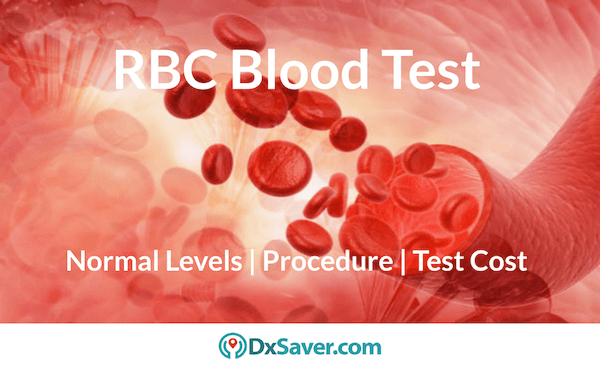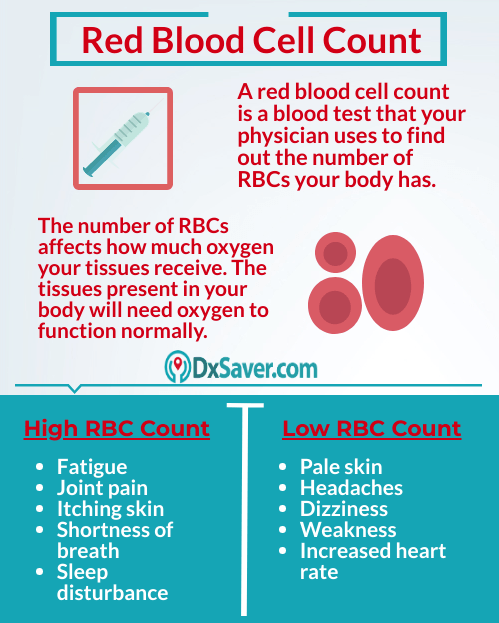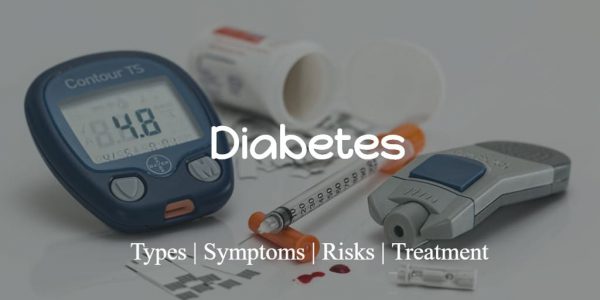
A red blood cell count is a blood test that your physician uses to find out the number of red blood cells (RBCs) your body has. It’s also called an erythrocyte count. Red blood cell count test is important because red blood cells contain hemoglobin, which carries oxygen to the tissues in your body. The number of RBCs affects how much oxygen your tissues receive. The tissues present in your body will need oxygen to function normally.
The article below will cover the significant and relevant topics of Red blood cell count that includes Test cost of RBC count, symptoms of RBC count, how the test is performed, Preparation before the test, Risk factors, Normal, high and low range of red blood cell count.
- RBC count test cost
- Why is RBC count needed?
- Symptoms of low Red Blood Cells count
- Symptoms of high Red Blood Cells count
- How is the RBC test count performed?
- Is there any preparation required before the test?
- Are there any risks in the test?
- What does the test result mean?
- Normal RBC count
- High Red Blood Cells count
- Lower RBC count
- Providers Locations
RBC count test cost
Red blood cell count test /RBC count test cost ranges between $59 and $179 in different labs and facilities across the United States. Also, the RBC test cost varies widely depending on the specific test(i.e. magnesium RBC blood test or Glucose 6-Phosphate Dehydrogenase (G6PD) and RBC test.
No prior appointment is required to get tested. Compare the price, order your test online and visit the nearest lab during lab business hours to get your test done. After completing the procedure, results will be mailed to you in 2 to 3 business days. We also provide doctor consultation for further treatment or for any kind of medical advice.
Magnesium RBC count blood test
The following table shows the magnesium RBC count blood test cost at 2 of our partner laboratories (CLIA – Certified) network located across the United States.
Name of our Partner Labs | Book Online |
HealthLabs
| Offer Price$79 |
Personal Testing Labs
| Offer Price$70 |
G6PD, Quantitative, Blood, and Red Blood Cell Count (RBC) Blood Test
The following table shows the G6PD, Quantitative, Blood, and Red Blood Cell Count (RBC) Blood Test cost at one of our partner laboratories (CLIA – Certified) network located across the United States.
Name of our Partner Labs | Book Online |
Personal Testing Labs
| Offer Price$59 |
RBC test cost with insurance
Many health insurance policies in the U.S. cover the cost for RBC count. However, the coverage of private health insurance companies and national health insurance programs like Medicare and Medicaid varies accordingly. So we recommend you to check your health insurance plan before getting tested for RBC count.
Our RBC count test providers do not accept any health insurance. Although, on request, they can provide you with an itemized receipt containing all the details like the name and code of the test, and CPT code which is necessary for insurance reimbursement purposes.
Why is RBC count needed?
According to the American Association for Clinical Chemistry (AACC), the RBC count test is a part of a complete blood count (CBC) test. A CBC test measures all the components present in your blood, including:
- Red blood cells
- White blood cells
- Hemoglobin
- Hematocrit
- Platelets
Your physician may order for the RBC test if they suspect you have a condition that affects your RBCs, or if you show symptoms of low blood oxygen. They could include:
- Bluish discoloration of the skin
- Confusion
- Irritability and restlessness
- Irregular breathing
If you have diagnosed blood condition that may affect RBC count, then your physician may order the test to monitor your condition or to know which treatment suits well. Your physician may use CBC tests to monitor conditions like leukemia and infections of the blood.

Symptoms of RBC count
If your Red blood cell count is high or low, you will experience a few symptoms and complications.
Symptoms of Low RBC count
The symptoms of low RBC count include:
- Fatigue
- Shortness of breath
- Dizziness, weakness, or Lightheadedness, particularly when you change positions quickly
- Increased heart rate
- Headaches
- Pale skin
Symptoms of high RBC count
The symptoms of high RBC count include:
- Fatigue
- Shortness of breath
- Joint pain
- Tenderness in the palms of your hands or soles of the feet
- Itching skin, particularly after a shower
- Sleep disturbance
If you experience these symptoms your physician will order an RBC count.
How is the RBC count test performed?
An RBC count is a simple blood test performed by your physician at his office. Your Physician will draw blood from your veins, usually from the inside of your elbow. The steps involved in the blood draw may include:
- The lab professional will clean the puncture with an antiseptic
- They will wrap an elastic band around your upper arm which makes your vein swell with blood which helps identify which vein to draw blood from
- Lab professionals will gently insert a needle into the vein and collect the blood in a tube.
- Then they will remove the needle and elastic band from your upper arm.
- Then the lab professional will send your blood sample to a laboratory for sample analysis.
Is there any preparation required before the test?
There’s particularly no special preparation needed for the RBC count test like fasting. But you should tell your physician if you’re taking medications for any other health condition. These may include any over-the-counter drugs and supplements. Your Physician will tell you about any other necessary precautions to be taken.
Are there any risks in the test?
There are no serious risks involved in the RBC count test. As with any blood test, there’s a risk of bleeding, bruising, and infection at the puncture wound. You might feel moderate pain or a pricking sensation when the needle enters your arm.
What does the test result mean?
Your physician may discuss results with you and they may order additional tests depending on the results. They include blood smears, where your blood is examined under a microscope. Blood smears will help your physician detect abnormalities in the blood cells, white blood cell disorders include leukemia and bloodborne parasites such as malaria.
Anemia is a health condition in which there is no adequate amount of healthy red blood cells to carry oxygen throughout your body. Following are the types of anemia:
- Iron deficiency anemia- It is often easily treated
- Sickle cell anemia- It results in bad shaped red blood cells that die very quickly
- Vitamin deficiency anemia- It often stems from low levels of vitamin B-12
All types of anemia require compulsory treatment. People having anemia feel tired and weak. They also experience headaches, cold hand, and feet, irregular heartbeats and dizziness. A bone marrow biopsy helps to show how cells of your blood are made within your bone marrow.
Diagnostic test such as ultrasounds or electrocardiograms helps to detect conditions related to the heart or kidney.
Normal RBC count
As per the reports from the Leukemia & Lymphoma Society:
- The normal RBC count ranges from 4.7 to 6.1 million cells per microliter (mcL) for men.
- The normal RBC count ranges from 4.2 to 5.4 million mcL for women who aren’t pregnant.
- The normal RBC count ranges from 4.0 to 5.5 million mcL for children
These ranges vary depending upon the laboratory or physician.
High Red Blood Cells count
- The higher RBC count ranges above 6.1 million cells per microliter (mcL) for men.
- The higher RBC count ranges above 5.4 million mcL for women.
- The higher RBC count ranges above 5.5 million mcL for children.
When you travel to a place at a higher altitude, your RBC count may increase for many weeks as there’s less oxygen in the air. There are few drugs such as gentamicin and methyldopa which may increase your RBC count.
Gentamicin is an antibiotic used to kill bacterial infections in your blood. Methyldopa helps to treat high blood pressure. It helps in relaxing the blood vessels to allow blood flow more easily through your body. Always tell your physician about any medications you undergo.
If your RBC count is higher than normal, then you may also have erythrocytosis. This can be because of:
- Cigarette smoking
- Congenital heart disease
- Dehydration
- Renal cell carcinoma
- Pulmonary fibrosis
- Polycythemia vera
A high RBC count may be the reason for sleep apnea, pulmonary fibrosis, and other health conditions that may cause low oxygen levels in your blood. Performance-enhancing drugs like protein injections and anabolic steroids will also increase RBC count. Kidney disease and cancers may lead to high RBC counts as well.
Treatment for high Red Blood Cells count
Your physician may recommend a procedure or medication to lower high red blood cell count if it is caused by a medical condition. By using a procedure called phlebotomy, a lab professional inserts a needle into the vein and drains blood through a tube into a bag. You will have to undergo this procedure on a regular basis until your red blood cell level is normal.
If you are diagnosed with the bone marrow disease, then your physician may prescribe a medicine called hydroxyurea which helps to slow down your body’s production of red blood cells. You’ll need to visit your physician regularly while taking hydroxyurea to check if your red blood cell level does not drop too low.
Red Blood Cells low count
A low level of RBC in the blood relates directly to a low level of oxygen in your body. In the United States, the low RBC count is 13.5 g/dL in a man and 12 g/dL in a woman. In children, RBC levels vary according to age.
If your RBC count is lower than normal count, then it may be caused because of:
- Anemia
- Bone marrow failure
- Erythropoietin deficiency, which is the cause of anemia with chronic kidney disease
- Hemolysis caused by transfusions
- Internal or external bleeding
- Leukemia
- Malnutrition
- Cancer of the plasma cells in bone marrow due to multiple myeloma
- Nutritional deficiencies, including deficiencies in iron, copper, folate, and vitamins B-6 and B-12 in your body
- Pregnancy
- Thyroid disorders
Drugs that can also lower your RBC count include:
- Chemotherapy drugs
- Chloramphenicol helps in treating bacterial infections
- Quinidine, taken to treat irregular heartbeats
- Hydantoins, which are used to treat epilepsy and muscle spasms traditionally
How to treat low RBC count
If your RBC count is low, then your body has to work harder to deliver oxygen throughout the body. Eating foods rich in these five nutrients can help you improve your red blood cell levels and they are:
- Iron
- Folic acid
- Vitamin B-12
- Copper
- Vitamin A
Red blood cells are the common cells in human blood and your body produces in millions every day. RBCs are produced in the bone marrow and circulate around your body for around 120 days. Low RBC count can put you at risk for a number of complications, so it’s important to get your RBC count back to normal as soon as possible.
Providers locations
A Red blood cell count test can be done in any of the following locations across the U.S. by visiting the nearest lab.
- Alabama
- Alaska
- Arizona
- Arkansas
- California
- Colorado
- Connecticut
- Delaware
- Florida
- Hawaii
- Georgia
- Idaho
- Illinois
- Indiana
- Iowa
- Kansas
- Kentucky
- Louisiana
- Maine
- Michigan
- Minnesota
- Mississippi
- Missouri
- Montana
- Nebraska
- Nevada
- New Hampshire
- New Mexico
- North Carolina
- North Dakota
- Oklahoma
- Oregon
- Pennsylvania
- Puerto Rico
- South Carolina
- South Dakota
- Tennessee
- Texas
- Utah
- Vermont
- Virginia
- Washington
- West Virginia
- Wisconsin
- Wyoming
Frequently Asked Questions
Will insurance cover my testing cost?
No, insurance will not be covered in the billing. However, they will provide you a receipt for insurance reimbursement purposes.
How should I book my appointment?
You can choose the most suitable provider from above and make an appointment by following the instructions mentioned by them.
Can I cancel my lab test order?
Yes, you can cancel your lab test order anytime before your testing. A refund will be initiated after deducting the cancellation fee. However, cancellation is at the discretion of the provider.
Do the providers offer result interpretations?
Yes, a few providers may provide doctor consultation who will take you through the results and provide clarification if needed.
How do I receive my report?
To ensure your privacy, the test report will be mailed to you by the provider.
Other topics you may be interested in:-
- Hemoglobin A1c Test Cost in the U.S.
- Anti-aging Testing Cost in the U.S.
- CBC Test cost in the U.S.
- What are the symptoms of throat cancer? Know more about treatment, diagnosis, & cure
- Signs and Symptoms of Oral Syphilis
- Creatinine Blood Test Cost in the U.S.
- Hormones Test for Pregnancy
- Cost of Lymphocyte Blood Test in the US
- Top 10 foods to lose weight
- How much does the CT Scan test cost in the U.S?
- Blood test TSH test cost in the U.S.
- CRP, C-reactive protein test cost in the U.S.
- Cortisol Test Cost in the U.S.
- C-Peptide Normal Levels, Test Results & Treatment
- What Types of STDs cause Dry Skin?
- Is Itching a Symptom of STD?
- Importance of CA 125 Testing & Ovarian Cancer in Women
- Oral STDs: Names, Symptoms, Treatment and Testing Cost
- Herpes Vs. HPV: Differences, Symptoms, and Testing Cost






